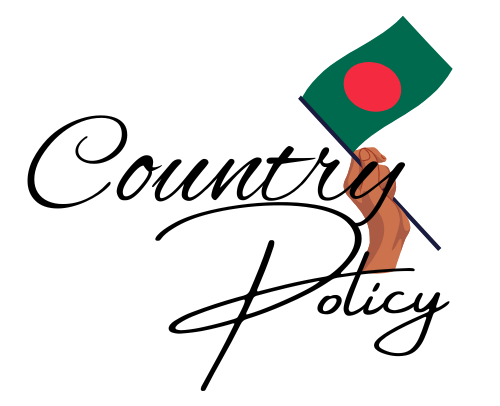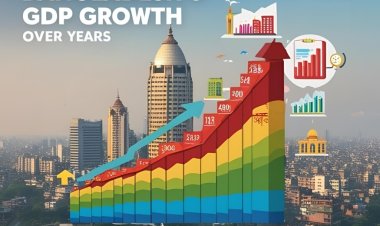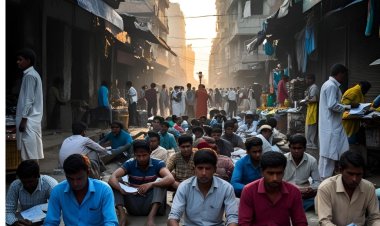Empowering Bangladesh's Youth through Employment in E-commerce and Tourism & Policy on Utilising Bangladesh's Large Population for Economic Benefit and Unemployment Reduction
Empowering Bangladesh's Youth through Employment in E-commerce and Tourism & Policy on Utilising Bangladesh's Large Population for Economic Benefit and Unemployment Reduction

Policy Proposal:
Empowering Bangladesh's Youth through Employment in E-commerce and Tourism & Policy on Utilising Bangladesh's Large Population for Economic Benefit and Unemployment Reduction.
Bangladesh is currently facing a significant challenge with high youth unemployment, which is hindering the nation’s economic progress. To address this pressing issue, a strategic policy is proposed to channel the energy and potential of young people into the burgeoning e-commerce and tourism sectors. By equipping the youth with the necessary skills and opportunities, Bangladesh can foster economic growth, create sustainable employment, and enhance its global standing.
Aims:
- Tackle Youth Unemployment: Provide young people with meaningful employment opportunities within the e-commerce and tourism industries.
- Boost Economic Growth: Harness the potential of these sectors, contributing to the nation’s economic expansion and resilience.
- Promote Digital Literacy: Ensure that the youth are equipped with essential digital skills, enabling them to thrive in the modern, technology-driven economy.
- Strengthen Tourism Infrastructure: Develop and promote tourism as a key pillar of economic development, fostering job creation and revenue generation.
- Stabilise the Economy: Leverage millions of opportunities within these sectors to stabilise the country's economy within the next five years.
Strategic Initiatives:
-
Comprehensive Skill Development Programmes:
- Introduce nationwide training initiatives focusing on e-commerce, digital marketing, and tourism management. Collaborate with educational institutions and private sector entities to provide accredited certifications and practical experience. Create online platforms offering accessible, cost-effective courses, ensuring inclusivity for all young people, particularly in underserved areas.
-
Financial Assistance and Incentives:
- Provide grants, low-interest loans, and financial incentives to young entrepreneurs looking to establish e-commerce businesses or tourism-related ventures.Offer tax relief and other financial incentives to companies that actively employ and train young people within these sectors.
-
Encouragement of E-commerce Entrepreneurship:
- Establish innovation hubs and business incubators that provide mentorship, resources, and networking opportunities for aspiring e-commerce entrepreneurs. Streamline the regulatory framework to facilitate the creation and operation of online businesses by young entrepreneurs. Foster public-private partnerships to support the growth and international reach of local e-commerce platforms.
-
Development of the Tourism Sector:
- Invest in improving infrastructure, including transportation, accommodation & digital connectivity, to enhance the overall tourist experience. Promote Bangladesh’s cultural heritage, natural landscapes & historical sites through targeted, international marketing campaigns. Encourage community-based tourism initiatives that engage local youth and preserve cultural traditions.
-
Integration of Digital and Technological Solutions:
- Promote the adoption of digital payment systems, advanced logistics, and other technologies that are critical to the success of e-commerce and tourism. Ensure that youth across all regions, including rural and remote areas, have access to the internet and the digital tools necessary to participate in these sectors.
-
Public Awareness and Engagement Campaigns:
- Launch a comprehensive, nationwide campaign to raise awareness of the opportunities available in e-commerce and tourism. Work with youth organisations, educational bodies, and community leaders to promote these sectors as viable and attractive career paths.
-
Monitoring and Evaluation Mechanisms:
- Establish a dedicated task force to oversee the implementation of this policy, ensuring that objectives are met and that the strategy remains relevant and effective. Collect and analyse data on youth employment rates, economic impact, and sector growth to continually assess and refine the policy’s effectiveness.
Expected Outcomes:
- A marked reduction in youth unemployment rates.
- Significant contributions from the e-commerce and tourism sectors to the national economy.
- A digitally literate, entrepreneurial youth population, prepared to compete in the global market.
- An enhanced international profile for Bangladesh as a top tourist destination.
- Economic stability achieved within the next five years through the creation of millions of job opportunities.
Bangladesh, with its vast and youthful population, has the potential to transform this demographic into a driving force for economic growth. This policy outlines strategies to harness the potential of Bangladesh's population to reduce unemployment and promote sustainable development.
Objectives
- Enhance Skill Development: Equip the workforce with relevant skills to meet the demands of local and global markets.
- Promote Entrepreneurship: Encourage innovation and entrepreneurship to create new job opportunities.
- Leverage International Employment: Expand opportunities for Bangladeshis to work abroad, sending remittances back home.
- Boost Domestic Industries: Support sectors with high employment potential, such as agriculture, manufacturing, and IT.
- Improve Labor Market Efficiency: Streamline labor market processes to match job seekers with available opportunities more effectively.
Policy Measures
1. Skill Development Programs
- Vocational Training: Establish vocational training centers across the country, focusing on industries with high demand, such as IT, construction, healthcare, and manufacturing.
- Public-Private Partnerships: Collaborate with private sector companies to design and implement skill development programs that meet industry standards.
- Digital Literacy Initiatives: Increase digital literacy among the youth to prepare them for jobs in the global digital economy.
2. Promotion of Entrepreneurship
- Startup Incubators: Develop business incubators in major cities and rural areas to support aspiring entrepreneurs with resources, mentorship, and funding.
- Access to Finance: Improve access to microloans and venture capital, particularly for women and young entrepreneurs.
- Tax Incentives: Provide tax incentives and subsidies for startups, especially in sectors with high employment potential.
3. Expanding International Employment Opportunities
- Foreign Employment Programs: Strengthen agreements with foreign governments to increase the number of Bangladeshis employed abroad.
- Training for Overseas Employment: Offer language and cultural training to workers seeking employment abroad to enhance their employability.
- Remittance Support Programs: Implement programs to encourage and facilitate the investment of remittances in local businesses and development projects.
4. Supporting Domestic Industries
- Agricultural Modernization: Invest in modern agricultural practices to increase productivity and create more jobs in rural areas.
- Manufacturing Sector Growth: Support the growth of the manufacturing sector through incentives, infrastructure development, and access to global markets.
- IT and Service Sector Expansion: Promote the IT sector by creating IT parks, offering tax incentives, and encouraging foreign investment in technology services.
5. Labor Market Reforms
- Job Matching Platforms: Develop and promote digital platforms that connect job seekers with employers, ensuring efficient labor market functioning.
- Labor Mobility Programs: Encourage internal migration to areas with higher employment opportunities, supported by housing and social services.
- Social Safety Nets: Strengthen unemployment benefits and social safety nets to support individuals as they transition between jobs.
Implementation Framework
- Government Leadership: The government will play a central role in coordinating and implementing these policies, with the involvement of relevant ministries and agencies.
- Stakeholder Collaboration: Collaborate with private sector partners, educational institutions, and international organizations to ensure the effective implementation of this policy.
- Monitoring and Evaluation: Establish a monitoring and evaluation framework to assess the impact of the policy, making adjustments as necessary to meet objectives.
By leveraging Bangladesh's large population and focusing on skill development, entrepreneurship, international employment, and industry support, this policy aims to reduce unemployment and drive sustainable economic growth. The government's commitment to these initiatives will ensure that Bangladesh's population becomes a powerful asset in the nation's development.
This policy represents a proactive and strategic effort to transform Bangladesh’s economic landscape by empowering its youth. Focusing on e-commerce and tourism not only addresses the immediate issue of youth unemployment but also positions Bangladesh as a leader in these dynamic, growth-oriented sectors. By leveraging the millions of opportunities within these industries, Bangladesh can stabilise its economy within the next five years. Success will depend on a collaborative effort between the government, private sector, educational institutions, and the youth themselves, working together towards a prosperous and sustainable future.
Email: dipu@countrypolicy.com
Dr. Raju Ahmed Dipu
Analyst, Social Entrepreneur
Specialist in European Business Law, Cloud Computing Law, and International Business.
Former Honorary Member of the International Trade Council.
Member of the German Chambers of Industry and Commerce.
Award: International Quality & Technology Award (Gold Category), 2018, Germany.
Former Co-Treasurer,
Bangladesh Nationalist Youth Party (JuboDal),
Central Executive Committee (2010-2017).
Exiled to Germany by Sheikh Hasina( Fomer PM) and the Awami League.
Copyright & Content Claim Statement for International Use
Effective Date: 08.12.2024
Website: https://countrypolicy.com/
Content Owner: Raju Ahmed Dipu
This website and its contents—hereinafter referred to as “the Content”—comprise original intellectual material relating to unemployment planning, national economic development, political analysis, leadership communications, and global governance frameworks.
Intellectual Property Value & Justification
The Content is hereby valued at Ten Billion US Dollars ($10,000,000,000 USD). This figure is grounded in:
Over 17 years of political experience in national and international contexts,
Field-tested planning and policy design derived from direct observation and engagement across more than 50 countries,
17 years of strategic thought leadership, including role as 2nd Spokesperson of the Uprising of 05 August in Bangladesh (2021-2024)—a pivotal democratic mobilisation,
Extensive contributions to political reform, economic policy, and development strategies during political exile in Germany,
Involvement in transnational policy platforms and global think tanks,
Creation of a scalable and innovative unemployment planning model intended for use at both national and international levels.
Legal Ownership
Raju Ahmed Dipu is the exclusive and lawful owner of all published and unpublished materials available via https://countrypolicy.com/. This includes all ideas, data, policy blueprints, terminologies, research summaries, and communications presented or implied on the platform.
Protected Content Includes (but is not limited to):
Unemployment planning frameworks and job creation policies
Economic and political development models
Leader communications, strategic doctrines, and public policy innovations
Country-specific or cross-border governance plans
Any similar or derivative idea rooted in the original Content
International Legal Protections
This Content is protected by international law under:
The Berne Convention,
The World Intellectual Property Organization (WIPO) Treaties,
The TRIPS Agreement under the World Trade Organization (WTO), and
The intellectual principles of the Global Idea Policy.
Use Prohibited Without Authorisation
No individual, government, agency, academic body, political organisation, or corporate entity may reproduce, adapt, cite, republish, or use this Content—wholly or in part—without prior written authorisation from Raju Ahmed Dipu.
This restriction applies internationally, including but not limited to:
The United Kingdom, United States of America, European Union Member States, Republic of India, Japan, Canada, People’s Republic of Bangladesh, and all other sovereign nations and intergovernmental institutions.
Legal Enforcement
Violation of these protections may result in:
Immediate legal action and cease-and-desist notifications,
Claims for monetary damages up to $10,000,000,000 USD,
Public and diplomatic disclosure of violations if state-level infringement is detected,
Civil, criminal, or international tribunal proceedings, depending on the jurisdiction and nature of infringement.
For licensing, permissions, or legal correspondence, please contact: dipu@countrypolicy.com


















